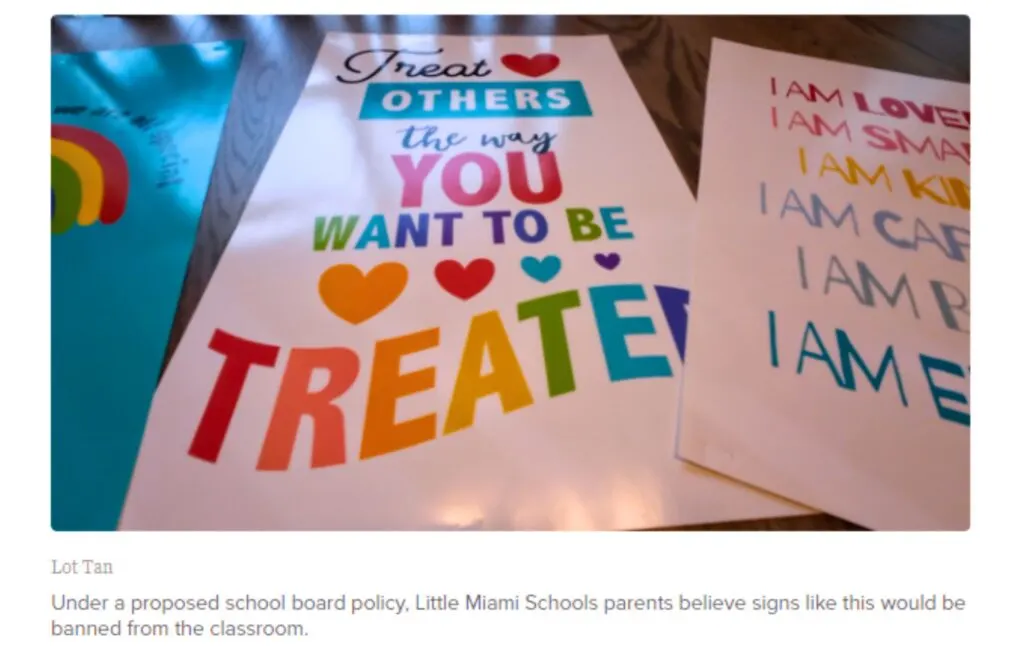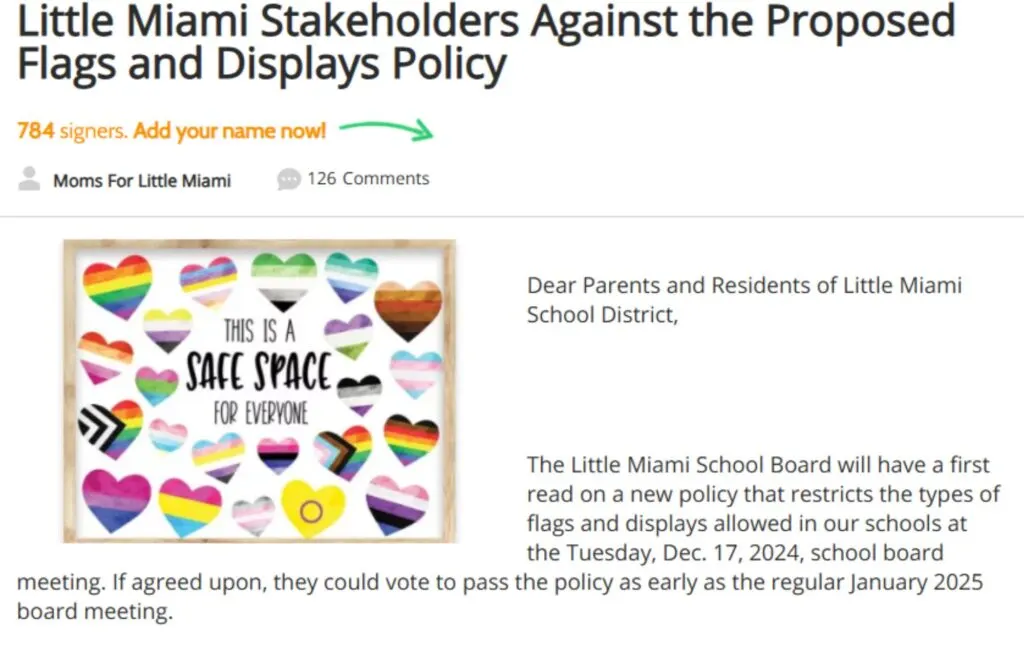Most teachers take pride in decorating their classrooms, carefully picking out colorful and inspiring posters and decorations. When students’ eyes wander the classroom, there are things they can learn just from what we have placed on the walls. Decorating my classroom is one of my favorite parts of starting a new school year.
The Little Miami School District in Maineville, Ohio, wants to mandate the exact materials a teacher can and cannot hang up in their classroom.
The policy, which was first introduced during a board of education meeting on Tuesday, December 10, looks to dictate what items are appropriate to display in classrooms across the Little Miami School District.

What can and can’t be displayed?
Teachers in the Little Miami School District would have to take down most of their classroom decorations if their school board passes the new policy that would ban many signs or posters. If passed, the policy would limit what teachers can use to decorate classrooms to a narrow list of eight item categories:
- The U.S. or Ohio flag
- The Little Miami flag or mascot
- Curriculum posters that are “part of a temporary unit of study”
- Superintendent-approved awards or recognition displays
- School sports displays
- Military, college, or university posters placed in “approved locations”
- Country flags representing foreign exchange students placed in “approved locations”
- School club flyers, notices, or invitations placed on “approved bulletin boards”
Under the policy, the display restrictions would extend beyond the classroom and include displays on stadium fencing, walls, doors, ceilings, district-owned vehicles, the district website, and the district email network.
ACLU sent cease and desist
The policy’s wording was borrowed from Big Walnut schools in Sunbury, which has received a cease and desist letter from the ACLU protesting Big Walnut’s recently passed policy.
Parents and Teachers Oppose the Policy
Vanessa Srikantham, a Little Miami substitute teacher and parent, laid a flurry of colorful classroom signage on her kitchen table. “You can do big things,” one reads. Another is inscribed with a reminder: “Treat others the way you want to be treated.” According to Srikantham, those and similar signs would be banned from district classrooms under the proposed school board policy.
“We have dealt with a lot of discord in the district in the past calendar year since the previous school board election,” Srikantham said. “Our community did not ask for this.”
School board member David Wallace, elected in November 2023, proposed the policy. “I ran on the fact that I was going to get politics out of the classroom, and I got roughly about 5,000 votes,” he said. “We should not have to worry that our children are being subjected to materials that go against your household’s values and beliefs.”
It is unclear what exactly sparked the need for this decor policy. When asked if the school district had any specific, documented issues related to classroom displays, Wallace said yes but didn’t provide details.
“Yes, there are some items in the classrooms. I do not believe it’s in every classroom, but it’s certainly enough to have this conversation,” he said. “I’ve walked into classrooms before, and I’ve seen the ‘Don’t tread on me’ flag. I’ve walked into other classrooms and seen an LGBTQ+ flag.”
Amanda Van Mil, a mom of three Little Miami School students, said, “There are not currently any LGBTQ+ support signs or stickers in any of the schools at Little Miami. But this would disallow anything like that from being kind of brought back in in the future.”
Sign the Petition!
Concerned by the idea of such a policy, Van Mil and Srikantham are promoting an online petition that emerged in opposition: Little Miami Stakeholders Against the Proposed Flags and Displays Policy. To date, more than 700 people have signed it.

“We have teachers who have signed it. We have employees who have signed it. We have former students who have signed it. And those are just people we know by looking at their names,” Srikantham said.
“I don’t put a lot of weight into that,” Wallace said of the petition. “A lot of the information that’s going around is not accurate, and people signing a petition are high school kids and stuff.”
Wayne Lyke, who has taught at Little Miami High School for 25 years and is president of the teachers’ union, said he has spoken with teachers at all of the district’s schools and with outside consultants.
“We are all in agreement,” Lyke told the school board, “that this policy is bad for students, bad for teachers, and generally bad for the district.”

Commentary from the Community
The following are some of the comments made by the public on the petition’s website:
“I am a Little Miami alumni and would have described the environment as ‘hostile’ at best for minority groups. This feels like a grab to make the hostility more known and acceptance harder to find in an already unaccepting place.”
“Don’t take away teachers’ ability to make their class warm & inviting.”
“As a history teacher, I have historical quotes, maps, and historical newspapers covering my walls. These displays, while not 100% related to my specific curriculum, paint a picture of “we’re here to learn history; it matters.” I’m afraid if I worked in Little Miami, I would be unable to display these items, making my classroom less welcoming.”
“As an alumna of Little Miami Local Schools, I strongly oppose this proposed policy. I believe it undermines the welcoming, creative, and inclusive environment essential for fostering student engagement and learning.
The school board surely has more pressing issues to address. During my time as a student and in the years since I’ve seen Little Miami struggle with challenges like funding. More attention should be given to budgetary concerns and ensuring that resources are used to support student success.
This policy feels like a solution to a problem that doesn’t exist, distracting from real issues that impact the district. It risks alienating the residents of this community and undermines the trust we place in our school leaders. Our students deserve better.” -Sonja (Koehler) Godfrey, Class of 2005
There is not one comment which supports the policy.
Overall, this is just another form of micromanaging teachers. If you trust teachers to teach your children all day, every day, you can trust them to pick out appropriate decor for their classrooms!

